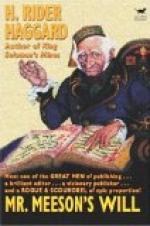“Yes,” said John.
“Well,” went on James, “I think that is all for the present. You will, of course, let me have the instructions and other papers with all possible speed. I suppose that other counsel besides myself will be ultimately retained?”
“Oh! that reminds me,” said Eustace; “about money, you know. I don’t quite see how I am going to pay for all this game. I have got about fifty pounds spare cash in the world, and that’s all: and I know enough to be aware that fifty pounds do not go far in a lawsuit.”
Blankly James looked at John and John at James. This was very trying.
“Fifty pounds will go a good way in out-of-pocket fees,” suggested James, at length, rubbing his bald head with his handkerchief.
“Possibly,” answered John, pettishly; “but how about the remuneration of the plaintiff’s legal advisers? Can’t you”—addressing Eustace—“manage to get the money from someone?”
“Well,” said Eustace, “there’s Lady Holmhurst. Perhaps if I offered to share the spoil with her, if there was any.”
“Dear me, no,” said John; “that would be ‘maintenance.’”
“Certainly not,” chimed in James, holding up his hand in dismay. “Most clearly it would be ‘Champerty’; and did it come to the knowledge of the Court, nobody can say what might not happen.”
“Indeed,” answered Eustace, with a sigh, “I don’t quite know what you mean, but I seem to have said something very wrong. The odds on a handicap are child’s play to understand beside this law,” he added sadly.
“It is obvious, James,” said John, that, “putting aside other matters, this would prove, independent of pecuniary reward, a most interesting case for you to conduct.”
“That is so, John,” replied James; “but as you must be well aware, the etiquette of my profession will not allow me to conduct a case for nothing. Upon that point, above all others, etiquette rules us with a rod of iron. The stomach of the bar, collective and individual, is revolted and scandalised at the idea of one of its members doing anything for nothing.”
“Yes,” put in Eustace, “I have always understood they were regular nailers.”
“Quite so, my dear James; quite so,” said John, with a sweet smile. “A fee must be marked upon the brief of learned counsel, and that fee be paid to him, together with many other smaller fees; for learned counsel is like the cigarette-boxes and new-fashioned weighing-machines at the stations: he does not work unless you drop something down him. But there is nothing to prevent learned counsel from returning that fee, and all the little fees. Indeed, James, you will see that this practice is common amongst the most eminent of your profession, when, for instance, they require an advertisement or wish to pay a delicate compliment to a constituency. What do they do then? They wait till they find L500 marked upon a brief, and then resign their fee. Why should you not do the same in this case, in your own interest? Of course, if we win the cause, the other side or the estate will pay the costs; and if we lose, you will at least have had the advantage, the priceless advantage, of a unique advertisement.”




